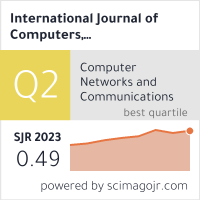An Improved ABC Algorithm for Energy Management of Microgrid
Keywords:
Artificial Bee Colony (ABC), optimization, economic dispatch, microgrid, swarm intelligenceAbstract
Microgrids are an ideal way of electricity generation, distribution, and regulation for customers by means of distributed energy resources on the community level. However, due to the randomness of photovoltaic and wind power generation, it is a crucial and difficult problem to achieve optimal economic dispatch in microgrids. In this paper, we present an optimal economic dispatch solution for a microgrid by the improved artificial bee colony (ABC) optimization, with the aim of satisfying load and balance demand while minimizing the cost of power generation and gas emission. Firstly, we construct a mathematical model according to different characteristics of distributed generation units and loads, and improve the performance of global convergence for ABC in order to fit such model. Secondly, we explore how to solve the optimal economic dispatch problem by the improved ABC and give the essential steps. Thirdly, we carry out several simulations and the results illustrate the benefits and effectiveness of the proposed approach for optimal economic dispatch in microgrid.References
Abid, S.; Zafar, A. (2017); Managing Energy in Smart Homes Using Binary Particle Swarm Optimization, Conference on Complex, Intelligent, and Software Intensive Systems, pp.189- 196, 2017.
Ahmad, M.; Khan, A. et al. (2017); A Hybrid Genetic Based on Harmony Search Method to Schedule Electric Tasks in Smart Home, International Conference on P2P, Parallel, Grid, Cloud and Internet Computing, pp.154-166, 2017.
Al-Saadi, M.; Luk, P.; Economou, J. (2017); Integration of the Demand Side Management with Active and Reactive Power Economic Dispatch of Microgrids, International Conference on Intelligent Computing for Sustainable Energy and Environment, pp.653-664, 2017.
Ali, W.; Rehman, A. et al. (2017); Home Energy Management Using Social Spider and Bacterial Foraging Algorithm, International Conference on Network-Based Information Systems, pp.245-256, 2017.
Azeem, M.; Amin, S. (2017); Scheduling of Appliances in Home Energy Management System Using Elephant Herding Optimization and Enhanced Differential Evolution, International Conference on Intelligent Networking and Collaborative Systems, 132-142, 2017.
Banerjee, B.; Jayaweera, D.; Islam, S. (2016); Micro Grid Planning and Operation, Smart Power Systems and Renewable Energy System Integration, 29-47, 2016.
Batool, S.; Khalid, A. et al. (2017); Pigeon Inspired Optimization and Bacterial Foraging Optimization for Home Energy Management, Advances on Broad-Band Wireless Computing, Communication and Applications, 14-24, 2017.
Chen, B.; Yang, Z.; Huang S. et al. (2017); Cyber-Physical System Enabled Nearby Traffic Flow Modelling for Autonomous Vehicles, 36th IEEE International Performance Computing and Communications Conference, Special Session on Cyber Physical Systems: Security, Computing, and Performance (IPCCC-CPS 2017), 2017.
Das, V.; Karuppanan, P. et al. (2017); Energy Grid Management, Optimization and Economic Analysis of Microgrid, Smart Energy Grid Design for Island Countries, 289-325, 2017.
Hongze, L.; Sen, G.; Bao, W. (2011); Analysis of sensitivity of the environmental value of wind power, Energy Procedia 5, 2576-2580, 2011. https://doi.org/10.1016/j.egypro.2011.03.442
Hu, B.; Wang, H.; Yao, S. (2017); Optimal economic operation of isolated community microgrid incorporating temperature controlling devices, Protection and Control of Modern Power Systems, 2-6, 2017.
Jadav, K. A.; Karkar, H. M.; Trivedi, I. N. (2017); A Review of Microgrid Architectures and Control Strategy, Journal of The Institution of Engineers (India): Series B, 98(6), 591-598, 2017.
Jansen, R.; Karki, R. (2017); Sustainable Energy Optimization in a Smart Microgrid, Sustainable Power Systems, 111-132, 2017.
Khan, S.; Khan, A. et al. (2017); Genetic Algorithm and Earthworm Optimization Algorithm for Energy Management in Smart Grid, International Conference on P2P, Parallel, Grid, Cloud and Internet Computing, 447-459, 2017.
Kremljak, Z.; Palcic, I.; Kafol, C. (2014); Project Evaluation Using Cost-Time Investment Simulation, International Journal of Simulation Modelling, 13(4), 447-457, 2014 https://doi.org/10.2507/IJSIMM13(4)5.279
Reddy, S. S.; Park, J. Y.; Jung, C. M. (2016); Optimal operation of microgrid using hybrid differential evolution and harmony search algorithm, Frontiers in Energy, 10(3), 355-362, 2016. https://doi.org/10.1007/s11708-016-0414-x
Sharma, T. K.; Pant, M.; Singh, V. P. (2011); Artificial Bee Colony Algorithm with Self Adaptive Colony Size, International Conference on Swarm, Evolutionary, and Memetic Computing, 593-600, 2011.
Trivedi, I. N.; Jangir, P.; Bhoye, M.; Jangir, N. (2016); An economic load dispatch and multiple environmental dispatch problem solution with microgrids using interior search algorithm, Neural Computing and Applications, 1-17, 2016.
Xu, L. Z.; Yang, G. Y. et al. (2017); A Coordinated Heat and Electricity Dispatching Model for Microgrid Operation via PSO, Life System Modeling and Intelligent Computing, 213-219, 2017.
Zhang, D.; Liu, S.; Papageorgiou, L. G. (2016); Energy Management of Smart Homes with Microgrid, Advances in Energy Systems Engineering, 507-533, 2016.
Zupancic, D.; Buchmeister, B.; Aljaz, T. (2017); Reducing the Time of Task Execution with Existing Resources ¨C Comparison of Approaches, International Journal of Simulation Modelling, 16(3), 484-496, 2017 https://doi.org/10.2507/IJSIMM16(3)10.394
Published
Issue
Section
License
ONLINE OPEN ACCES: Acces to full text of each article and each issue are allowed for free in respect of Attribution-NonCommercial 4.0 International (CC BY-NC 4.0.
You are free to:
-Share: copy and redistribute the material in any medium or format;
-Adapt: remix, transform, and build upon the material.
The licensor cannot revoke these freedoms as long as you follow the license terms.
DISCLAIMER: The author(s) of each article appearing in International Journal of Computers Communications & Control is/are solely responsible for the content thereof; the publication of an article shall not constitute or be deemed to constitute any representation by the Editors or Agora University Press that the data presented therein are original, correct or sufficient to support the conclusions reached or that the experiment design or methodology is adequate.








